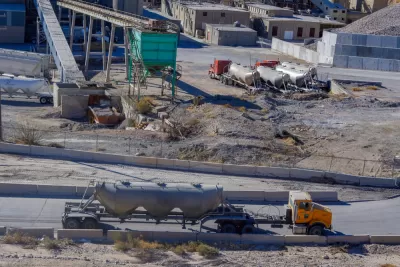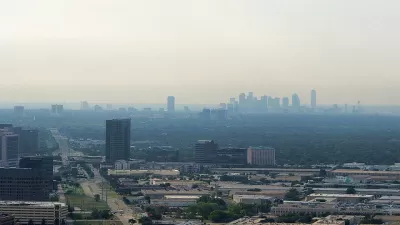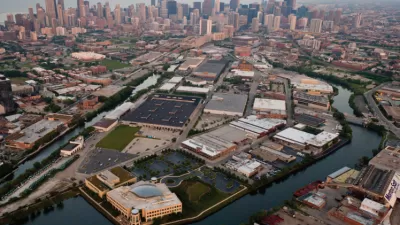Zoning in the U.S. was originally intended to keep noxious uses out of residential areas. Around Houston, which famously lacks a traditional zoning system, polluting uses are still granted broad permission to operate in residential areas.

Allyn West reports on the environmental problems created by concrete batch plants, and the residential neighborhoods dealing with the consequences.
The scene for this environmental justice drama is Harris County, Texas, where the Texas Commission on Environmental Quality (TCEQ) has granted 188 concrete plants the permits to operate, mostly in unincorporated parts of the county like Aldine, where eight concrete plants are currently operating. In Aldine, at least, local residents have scored a pair of recent victories to keep new concrete plants out.
"Though they produce one of the ubiquitous materials of cities, the concrete we pour for everything from sidewalks to stormwater pipes to skyscrapers, the unique combination of Houston’s lack of zoning, the region’s relentless outward growth and an overly permissive state environmental agency means that too many concrete batch plants are making it too hard to breathe," according to West.
This environmental justice issue has roots in the racist land use controls of the past, according to West. "Because land has been cheapened by redlining, disinvestment, restrictive covenants and environmental racism, polluters concentrate unevenly across the region, often intentionally in communities of color and low wealth, compounding other issues and creating entrenched disparities, almost all of which are being exacerbated by the coronavirus pandemic. Those who are exposed the most to pollution are the least responsible for it."
From the experiences of the community in Aldine, however, a model for resistance to the permissiveness of the TCEQ has emerged.
FULL STORY: ou don't want to live near a concrete batch plant. But TCEQ lets it happen too easily.

Planetizen Federal Action Tracker
A weekly monitor of how Trump’s orders and actions are impacting planners and planning in America.

Maui's Vacation Rental Debate Turns Ugly
Verbal attacks, misinformation campaigns and fistfights plague a high-stakes debate to convert thousands of vacation rentals into long-term housing.

Cuomo Is the Candidate of Both NIMBYs and Developers. What Gives?
In the New York City mayoral race, odd bedfellows align to preserve the housing status quo.

San Antonio and Austin are Fusing Into one Massive Megaregion
The region spanning the two central Texas cities is growing fast, posing challenges for local infrastructure and water supplies.

Charlottesville Temporarily Has No Zoning Code
A judge ordered the Virginia city to throw out its newly revised zoning code, leaving permitting for new development in legal limbo.

In California Battle of Housing vs. Environment, Housing Just Won
A new state law significantly limits the power of CEQA, an environmental review law that served as a powerful tool for blocking new development.
Urban Design for Planners 1: Software Tools
This six-course series explores essential urban design concepts using open source software and equips planners with the tools they need to participate fully in the urban design process.
Planning for Universal Design
Learn the tools for implementing Universal Design in planning regulations.
Heyer Gruel & Associates PA
JM Goldson LLC
Custer County Colorado
City of Camden Redevelopment Agency
City of Astoria
Transportation Research & Education Center (TREC) at Portland State University
Jefferson Parish Government
Camden Redevelopment Agency
City of Claremont





























